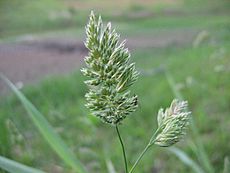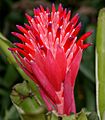Poales facts for kids
Quick facts for kids Poales |
|
|---|---|
 |
|
| Scientific classification | |
| Kingdom: | |
| Division: | |
| Class: | |
| Order: |
Poales
Small
|
| families | |
|
See text |
|
Poales is a taxonomic order of flowering plants in the monocotyledons. The order includes families of plants such as the grasses, bromeliads, and sedges.
The earliest fossils attributed to the Poales date to the late Cretaceous period about 66 million years ago, though some suggest the origin of the group may be 115 million years ago in South America. The earliest known fossils include pollen and fruits.
The flowers are typically small, enclosed by bracts, and arranged in inflorescences (except in the genus Mayaca, with solitary terminal flowers). The flowers of many species are wind pollinated; the seeds usually contain starch.
One recent classification lists these families:
- order Poales
- family Anarthriaceae
- family Bromeliaceae
- family Centrolepidaceae
- family Cyperaceae
- family Ecdeiocoleaceae
- family Eriocaulaceae
- family Flagellariaceae
- family Joinvilleaceae
- family Juncaceae
- family Mayacaceae
- family Poaceae
- family Rapateaceae
- family Restionaceae
- family Thurniaceae
- family Typhaceae
- family Xyridaceae
Uses
The Poales are the most economically important order of monocots and possibly the most important order of plants in general. Within the order, by far the most important family economically is the family of grasses (Poaceae, syn. Gramineae), which includes barley, maize, millet, rice, and wheat. It is also the largest family in the order, far outnumbering the other families:
- Poaceae: 12,070 species
- Cyperaceae: 5,500 species
- Bromeliaceae: 3,170 species
- Eriocaulaceae: 1,150 species
Images for kids
-
Billbergia pyramidalis of family Bromeliaceae
-
Typha latifolia, Typhaceae
-
Foxtail millet, Poaceae
See also
 In Spanish: Poales para niños
In Spanish: Poales para niños









